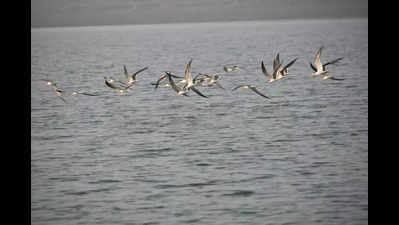
Prayagraj: The upcoming Maha Kumbh will offer bird enthusiasts a remarkable experience along the banks of Ganga as more than 150 pairs of endangered Indian skimmers along with other migratory bird have started gathering at the Sangam. The melodious chirping of these vibrant guests known as ‘bird sound therapy' blends harmoniously with the gentle flow of the Ganga, creating a surreal symphony. The anticipated arrival of the peregrine falcon will add to the excitement.
This bird, recognised as the world's fastest, achieves diving speeds of 300 km/h, surpassing the bullet trains of Japan and China. This significant gathering of birds demonstrates the state govt's dedication to developing eco-tourism in Uttar Pradesh. The forest department plans to organise a Bird Festival to commemorate this natural occurrence before the Maha Kumbh.
Alok Kumar Pandey, IT head of the forest department, said: "Numerous migratory birds, including the endangered Indian skimmer and Siberian crane, have already flocked to Sangam. A dedicated wildlife team is meticulously monitoring these native and migratory birds round-the-clock." Wildlife community officer KP Upadhyay discussed the Indian skimmer's environmental importance, noting their contribution to water quality and pollution reduction.
"This breathtaking spectacle at Sangam is a testament to the harmonious coexistence of nature and human celebration," he said. Indian skimmers, visible on the dunes during morning and evening hours, are among 90-plus bird species, including Siberian, black, and sarus cranes, expected to arrive in Sangam city in winters. These avian visitors travel from over 10 countries, including Siberia, Mongolia and Afghanistan.
Ornithologists share interesting facts about Indian skimmers, known as Panchira in India due to their water-skimming behaviour. These vulnerable birds produce three eggs per clutch and show collaborative parenting. While females guard the eggs, males transport water in their wings to keep them moist, alternating these duties.
Siberian birds have established their winter residence at the rivers' confluence, marking seasonal changes..














